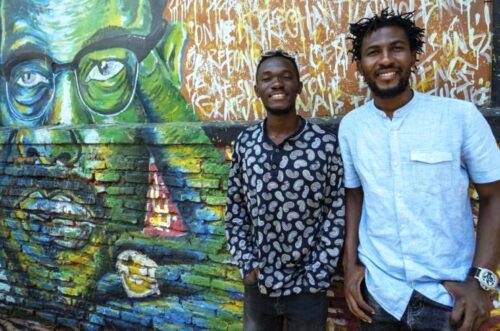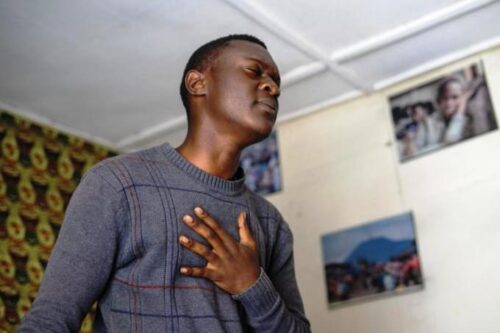DR Congo. North Kivu. The Word that Sets you Free.
Every Saturday they meet in a modest place where they share their creations and subject themselves to criticism from others.
They learn to express feelings, reality or their outlook on life while improving their pronunciation, bodily expression
and expanding their daily references.
Slam poetry (a mix of poetry recital, rap, comedy and performance) has become a business tool, a much more powerful weapon than those they are used to seeing in Goma, the capital of North Kivu (in the east of the Democratic Republic of Congo). Anyone who proudly supports it and says that slam is the art of listening to each other, ‘the encounter between mouth and ear’, knows no rest because it was born between the 90s and the early years of this century.
From the hand of Depaul Bukulu, co-founder of Goma Slam Session, we access one of his regular Saturday rehearsals. Three hours in which they test their written, oral or bodily expression and submit to the verdict of their companions who, amidst applause or boos, express in real time what they are feeling, and what causes them. Subsequently, in a more detailed analysis, they recall words whose diction was incorrect or moments when the music overlapped the text.

Depaul Bukulu (R), with another of the founders of Goma Slam Session. (Photo: Carla Fibla García-Sala).
The veterans support those who have a hard time overcoming the shame of putting themselves in front of the pack. They are the centre of all eyes and capture the attention of all those who, in addition to putting their creativity to the test, are there to learn and improve their technique. It is a space of freedom where a critical spirit and self-esteem are cultivated and values such as peace and tolerance are promoted. An oasis where the 143 members who make up the collective – 30 of them are women – allow themselves to stop thinking about the conflict that has been afflicting eastern DRC for three decades and focus on writing workshops and projects that are bearing fruit. It is the power of the word – the strength it acquires when you sing it with determination and rely on a catchy musical rhythm – that ensures that no one dares to disconnect from the moment it is shared.
“The slam session is one of our activities, of our programs, in the collective. There are weekly workshops that we organize to comment on the texts and the recital that slammers or aspiring slammers are working on. It’s about giving our opinion so that everyone can learn from others and that we evolve together. We read the texts, we share our experiences and our ideas in relation to writing or society. The goal is to bring our daily life, our way of thinking and of cultivating the word closer together”, explains one of the founders of Goma Slam Session.
Freedom and its rules
There are two specific guidelines at the Goma Slam Session: ‘beware of plagiarism’ and ‘it is prudent to point out and tolerate, respecting our different points of view’.
The style is free because they don’t want to limit the creativity of those who come to the clubs trying to be themselves. But there are rules in the construction of oral poems, spoken stories in rhyme, which they learn little by little as they are corrected by their peers, or observe their reactions during their performance.
In the Saturday sessions, they feel at ease and let go. Just because someone praises a work does not mean that whoever expresses himself will then support it, and this meeting of different opinions creates a climate of trust and complicity in which criticism is constructive and everyone is aware of the good that having become slammers does them.

One of the slammers attends the workshops every Saturday to perfect the rhythm of his recital as well as his pronunciation and syntax. (Photo: Carla Fibla García-Sala).
In addition to Saturdays, the collective organizes maarifa (thinking) meetings which are a moment of discussion and exchange based on a theme related to peace or conflict in the region where they often touch on current issues that concern the young participants.
The activity takes place around a bonfire, which brings improvisation closer to the construction of the traditional African story, where the power of storytelling reigns.
They also hold a slam night at the end of each month for those who feel prepared to face an unfamiliar audience. Here, the theme usually focuses on the daily difficulties they face. With the ‘Slam in Schools’ program they have taught more than 20,000 boys and girls in more than 20 schools in Goma what slam poetry is. “Learning to express ourselves in the context of conflict in which we live and in which we have learned to accept everything without asking questions” is, according to Bukulu, the goal. They also focus on minors who have suffered sexual violence using slamotherapy, to ‘heal with words’ and learn to free themselves from what oppresses them and return to being themselves after the trauma.

DR Congo. North Kivu: A child plays near peacekeepers. Photo MONUSCO/Abel Kavanagh
This initiative is accompanied by ‘Slam en feminino’ – writing and acting workshops exclusively for them – and ‘Slam Elikya’ – which means ‘hope’ – because they are convinced that poetry can generate smiles and ensure that young people do not throw in the towel.
They also go to juvenile detention centres and homes for homeless children to show them that by writing and expressing their feelings aloud, they not only force them to reflect on their situation but also ‘feel free’, adds Bukulu. They are also starting to work in centres with people with special abilities who often feel left out.
A five-year period
The works began to consolidate in 2017 when they acquired the premises. Each member puts in a dollar a month to pay the rent and create a small fund that they set aside for travel and the purchase of equipment for activities. It is a horizontal organization in which everyone assumes responsibility and takes possession of the place. An incipient library for consulting new words and reading that is receiving donations occupies one of the rooms. The space is open from Monday to Sunday, at any time. “I like to write about violence, justice, and love. With slam poetry, I feel able to defend my way of thinking and acting in front of men”, explains Vanesa, who has been practising for two and a half years and considers it a complement to her studies, even if her parents do not fully understand what she is doing. (Open Photo: Goma with Mount Nyiragongo in the background. CC BY-SA 2.0/ MONUSCO / Abel Kavanagh)
Carla Fibla García-Sala



